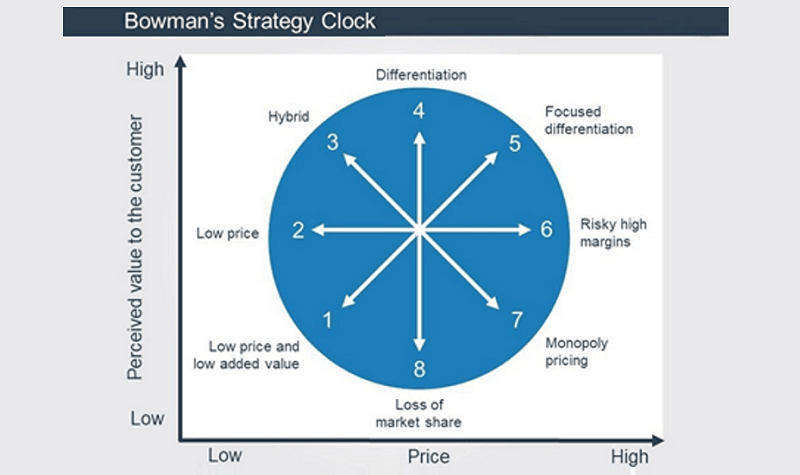
Bowman’s Strategy Clock presents various ways to position product/services and is a useful tool to understand how firms compete based on price and perceived value.
Bowman’s strategic clock is another strategic tool that provides businesses with several options to position their products/services in the market. It suggests eight different ways to position product/services (BOWMAN & FAULKNER, 1997).
Before Bowman and Faulkner developed their Strategy Clock, Porter’s generic strategies suggested how firms could achieve a competitive advantage. Cliff Bowman and David Faulkner extended Porter’s three strategic positions (Differentiation, Cost, Focus) to eight using various combinations of cost and perceived value.
Bowman’s strategic clock is a useful tool for firms to understand their strategic position and to analyze if they should make any adjustements to their existing strategy in order to imporve their competitive position in the marketplace.
Bowman suggests eight ways to position product/services:
- Low price and low added value; this is the least competitive position of all the options.
- Low Price: Price is low but valued; companies provide low prices by economies of scale.
- Hybrid: Provide low price as well as differentiation.
- Differentiation: Highly differentiated products, customers highly value the products
- Focused Differentiation: High quality products that are expensive (luxury)
- Risky High margins: Mediocre products but sold at high prices; a risky approach
- Monopoly pricing: The company is big and acts as a monopoly
- Loss of Market Share: Customers do not value the products, products are priced higher
In Bowman’s strategic clock, “Focused Differentiation” refers to products that the company wants to position as something that is of high quality and also expensive, sort of an exclusive product (BOWMAN & FAULKNER, 1997).
References
Bowman, C. and Faulkner, D., 1997. Competitive and corporate strategy. Irwin.
BATheories.com is managed by a group of educators from Mumbai. We also manage the website AcademicsHQ.com. Our panel includes experienced professionals and lecturers with a background in management. BATheories is where we talk about the various business theories and models for BA (Business Administration) students.